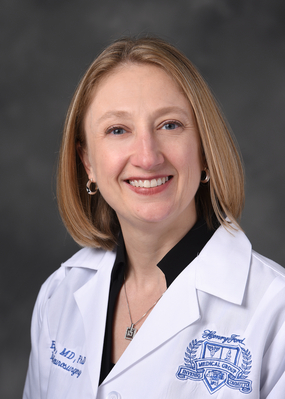National Neurosurgery Organizations Collaborate to Establish Professionalism Policy for Meetings, Professional Events

DETROIT (March 30, 2021) – Ellen Air, M.D., Ph.D., director of the Neurosurgery Residency Program at Henry Ford Health System and Chair-Elect of the American Association of Neurological Surgeons (AANS)/Congress of Neurological Surgeons (CNS) Joint Section on Women in Neurosurgery, is co-author of a new Professionalism and Harassment Model Policy created to provide a code of ethical behavior that promotes professional growth and the free exchange of ideas at neurosurgical meetings, educational courses, conferences and other sponsored events.
The policy was a collaborative effort by the American Academy of Neurological Surgery (AAcNS), AANS, American Board of Neurological Surgery (ABNS), CNS, and Society of Neurological Surgeons (SNS). Unlike events held at one’s home institution, professional gatherings held at neutral locations often do not have clear rules and jurisdiction regarding professional conduct. The One Neurosurgery Summit Taskforce on Professionalism and Harassment, on which Dr. Air serves, has developed this foundational policy to establish common expectations for behavior and a unified roadmap for the prompt response to behavior that violates these expectations.
“Annual conferences, educational courses, and other meetings bring together a diverse community of individuals, yet also create a unique environment in which sensitivities vary by individual,” said Dr. Air. “What may feel appropriate for one person based on beliefs or culture may not be appropriate for others gathered at the same event. Through this new policy, we aim to bring greater attention to everyone’s responsibility for ensuring a safe and respectful space for education, and hope that other medical organizations will establish their own meeting and conference policies.”
As outlined by the policy, participants of any AAcNS, AANS, ABNS, CNS or SNS event are prohibited from engaging in any behavior that will undermine or interfere with the goals and purposes of the event, including but not limited to:
- The use of offensive or insensitive language or behavior;
- The use of denigrating comments based on race, national or ethnic origin, color, religion,
age, sex, sexual orientation, gender or disability; or - Harassment, threatening behavior or similar intimidation
The new policy also sets forth expectations of host organizations to ensure the code of ethical behavior is followed and to provide a procedure for investigating complaints. It requires the participating organizations to adopt their own codes of ethics that will be consistent with the Professionalism and Harassment Model Policy.
The American Medical Association (AMA), the largest organization of physicians and medical students, adopted a similar “Anti-Harassment Policy” in 2017. This policy specifically expanded the AMA’s code of conduct to apply to conferences and other events sponsored by the organization. The AMA is among a small number of medical organizations to have established policies that apply to medical meetings and conferences.
To learn more, read the article titled “Developing a Professionalism and Harassment Policy for Organized Neurosurgery” in the Journal of Neurosurgery.
###
About Henry Ford Health System
Founded in 1915 by Henry Ford himself, Henry Ford Health System is a non-profit, integrated health system committed to improving people’s lives through excellence in the science and art of healthcare and healing. Henry Ford Health System includes Henry Ford Medical Group, with more than 1,900 physicians and researchers practicing in more than 50 specialties at locations throughout Southeast and Central Michigan. Acute care hospitals include Henry Ford Hospital in Detroit, MI and Henry Ford Allegiance Health in Jackson, MI – both Magnet® hospitals; Henry Ford Macomb Hospital; Henry Ford West Bloomfield Hospital; and Henry Ford Wyandotte Hospital.
The largest of these is Henry Ford Hospital in Detroit, a quaternary care research and teaching hospital and Level 1 Trauma Center recognized for clinical excellence in cardiology, cardiovascular surgery, neurology, neurosurgery, and multi-organ transplants. The health system also provides comprehensive, best-in-class care for cancer at the Brigitte Harris Cancer Pavilion, and orthopedics and sports medicine at the William Clay Ford Center for Athletic Medicine – both in Detroit.
As one of the nation’s leading academic medical centers, Henry Ford Health System annually trains more than 3,000 medical students, residents, and fellows in more than 50 accredited programs, and has trained nearly 40% of the state’s physicians. Our dedication to education and research is supported by nearly $100 million in annual grants from the National Institutes of Health and other public and private foundations.
Henry Ford’s not-for-profit health plan, Health Alliance Plan (HAP), provides health coverage for more than 540,000 people.
Henry Ford Health System employs more than 33,000 people, including more than 1,600 physicians, more than 6,600 nurses and 5,000 allied health professionals.
MEDIA CONTACT: Jeff Adkins / jadkins6@hfhs.org / 586.307.2027
.svg?iar=0&hash=F6049510E33E4E6D8196C26CCC0A64A4)

/hfh-logo-main--white.svg?iar=0&hash=ED491CBFADFB7670FAE94559C98D7798)









